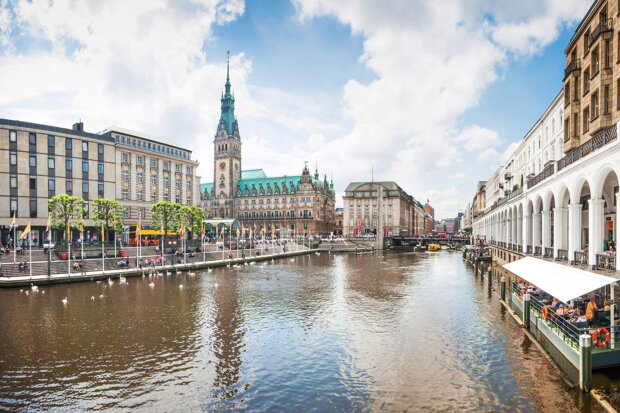Hamburg is the second-largest city in Germany. In terms of population, it is only surpassed by Berlin, as reported by Ukr.Media.
Hamburg is recognized as the greenest city in Germany, with approximately 14% of its territory occupied by parks and gardens. Despite having around 1,800,000 residents, there are no skyscrapers in the city.

This is a conscious effort to preserve the city's historical appearance. By the way, the first settlement in the area of present-day Hamburg appeared around the 8th century AD.
It gained city status on May 7, 1189. According to sociological surveys, 93% of Hamburg residents are convinced that they live in the most beautiful city.

Hamburg is the second-largest city in Germany, second only to Berlin in terms of population. However, when it comes to the number of bridges, no city in the world can match Hamburg, as it has around two and a half thousand bridges. That's more than Venice and Amsterdam combined. The longest bridge in the city is the "Köhlbrand," opened in 1974, stretching for 3,940 meters.

Due to its extensive parkland, the city of Hamburg covers a large area of 755 square kilometers. In terms of this indicator, Hamburg surpasses Paris by 7 times. On average, each resident of Hamburg has about 30 square meters of living space.

Since 1674, there has been an unusual profession in Hamburg called the "Swan Father." There is a legend in the city that Hamburg will exist as long as swans swim in the Alster River. Therefore, these birds receive special care. Every autumn, the "Swan Father" transports the swans by boat to a pond with warm water, and in spring, he returns them to the river.

The Hamburg Fish Market is one of the city's main landmarks. Visiting the city without experiencing this market is considered inappropriate. The market has been open for over 300 years and is visited by approximately 70,000 people every week.
The market opens early in the morning, but regular customers claim that there is no need to rush here at dawn. If you come closer to closing time, you can expect a significant discount.

The hamburger received its name in honor of the German city, although it originated not in Germany but in the United States. German immigrants established sandwich production at the end of the 19th century, providing a quick and tasty snack. Until 1946, the price of hamburgers in the US was standardized at 5 cents. The birthday of the hamburger is celebrated annually on July 27.
On July 22, 1887, Gustav Ludwig Hertz, a renowned physicist who became a Nobel laureate in 1925, was born in Hamburg. He passed away in 1975 in Berlin but is buried in Hamburg alongside his relatives.

The Hamburg U-Bahn (metro) was opened in 1912. Currently, the total length of the city's underground lines is approximately 104 kilometers. There are no turnstiles at the entrances, but ticket controllers regularly patrol the trains to check for valid tickets. The fine for fare evaders is quite significant, amounting to 40 euros.

Hamburg SV is one of the most popular football clubs in Germany. The team has been playing in the Bundesliga (the top football division in the country) since its establishment in 1963 and remained in the league for over 50 years.
However, all good things come to an end. In the spring of 2018, Hamburg SV was relegated from the top division, finishing in 17th place. Angry fans set off flares on the pitch, and even the police had to intervene.
How did the expression "Hamburg score" originate? There were rumors that tournaments of the strongest professional wrestlers were carefully staged, and the results of the fights were predetermined. But once a year, athletes secretly gathered in Hamburg and determined the strongest among them in fair competition.

In 2007, the Emigration Museum was opened in Hamburg. From the 19th to the first half of the 20th century, about 5 million immigrants departed from the port of Hamburg to America.

The Hamburg-America Line, organized in 1847, specialized in transporting emigrants from Europe to the New World. The museum houses a vast collection of emigration documents, allowing visitors to search for information about their ancestors.

Hamburg is the birthplace of Germany's Chancellor Angela Merkel. She was born in this city on July 17, 1954. However, Merkel didn't live in Hamburg for long.

After a few weeks, she moved to East Germany (GDR) where her father, Horst Kasner, received a position as a pastor in one of the Lutheran Church parishes. Angela Merkel became the first female Chancellor in German history.
Read more: "Game of Thrones" stars Kit Harington and Rose Leslie welcome their second child. Details
As we wrote earlier: The stunning Demi Moore is in the spotlight again: her tan and figure look amazing, and she doesn't hide it in photos





































